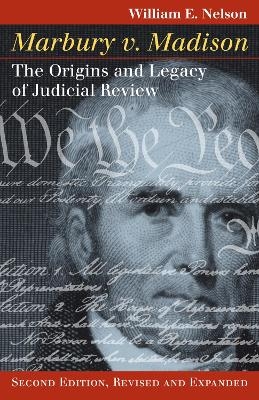
Marbury v. Madison
The Origins and Legacy of Judicial Review, Second Edition, Revised and Expanded
Seiten
2018
University Press of Kansas (Verlag)
978-0-7006-2653-3 (ISBN)
University Press of Kansas (Verlag)
978-0-7006-2653-3 (ISBN)
- Lieferbar (Termin unbekannt)
- Versandkostenfrei
- Auch auf Rechnung
- Artikel merken
Relates the story behind Marbury v Madison and explains why it is a foundational case for understanding the US Supreme Court. Nelson reveals how John Marshall deftly avoided a dangerous political confrontation between the executive and judicial branches by upholding the rule of law, and how he managed to shore up the Court's prestige and power rather than have it serve partisan political agendas.
On the surface, the case itself seems a minor one at best. William Marbury, a last-minute judicial appointee of outgoing Federalist president John Adams, demanded redress from the Supreme Court when his commission was not delivered. But Chief Justice John Marshall could clearly see the danger his demand posed for a weak court filled with Federalist judges. Wary of the Court’s standing with the new Republican administration of Thomas Jefferson, Marshall hit upon a solution that was both principled and pragmatic. He determined that while Marbury was justified in his suit, the law on which his claim was based was in conflict with the Constitution. It was the first time that the Court struck down an act of Congress as unconstitutional, thus establishing the doctrine of judicial review that designates the Court as chief interpreter of the Constitution.Nelson relates the story behind Marbury and explains why it is a foundational case for understanding the Supreme Court. He reveals how Marshall deftly avoided a dangerous political confrontation between the executive and judicial branches by upholding the rule of law. Nelson also shows how Marshall managed to shore up the Court’s prestige and power rather than have it serve partisan political agendas.
On the surface, the case itself seems a minor one at best. William Marbury, a last-minute judicial appointee of outgoing Federalist president John Adams, demanded redress from the Supreme Court when his commission was not delivered. But Chief Justice John Marshall could clearly see the danger his demand posed for a weak court filled with Federalist judges. Wary of the Court’s standing with the new Republican administration of Thomas Jefferson, Marshall hit upon a solution that was both principled and pragmatic. He determined that while Marbury was justified in his suit, the law on which his claim was based was in conflict with the Constitution. It was the first time that the Court struck down an act of Congress as unconstitutional, thus establishing the doctrine of judicial review that designates the Court as chief interpreter of the Constitution.Nelson relates the story behind Marbury and explains why it is a foundational case for understanding the Supreme Court. He reveals how Marshall deftly avoided a dangerous political confrontation between the executive and judicial branches by upholding the rule of law. Nelson also shows how Marshall managed to shore up the Court’s prestige and power rather than have it serve partisan political agendas.
William E. Nelson is the Judge Edward Weinfeld Professor of Law at the New York University School of Law.
| Erscheinungsdatum | 10.07.2018 |
|---|---|
| Verlagsort | Kansas |
| Sprache | englisch |
| Maße | 152 x 229 mm |
| Gewicht | 380 g |
| Themenwelt | Geisteswissenschaften ► Geschichte ► Regional- / Ländergeschichte |
| Geschichte ► Teilgebiete der Geschichte ► Militärgeschichte | |
| Recht / Steuern ► EU / Internationales Recht | |
| Recht / Steuern ► Öffentliches Recht ► Verfassungsverfahrensrecht | |
| Recht / Steuern ► Rechtsgeschichte | |
| ISBN-10 | 0-7006-2653-0 / 0700626530 |
| ISBN-13 | 978-0-7006-2653-3 / 9780700626533 |
| Zustand | Neuware |
| Haben Sie eine Frage zum Produkt? |
Mehr entdecken
aus dem Bereich
aus dem Bereich
neueste Manipulationstechniken als Waffengattung der NATO
Buch | Softcover (2023)
Westend (Verlag)
CHF 33,55


